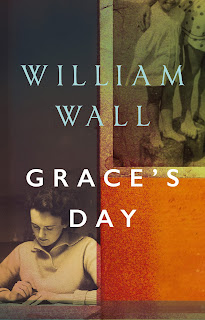Grace's Day - William Wall
In fact the opening of the book it does just seem to be a reflection on Grace Newman’s childhood experiences living on an largely uninhabited island off the west coast of Ireland. You get a sense of an unconventional childhood, one shaped by the impressions of nature and the wild, but from the general tone of her descriptions you slowly begin to feel that Grace’s life has been shaped by other family events that have created bigger problems and divisions that outweigh any notion of this being a memoir of an idyllic childhood.
What initially strikes you as odd and later with a sense of outrage, is that Grace’s father Tom Newman is mostly absent from the lives of his wife Jane and daughters Grace, Jeannie and Em. He has left them to fend largely for themselves on this island almost as an experiment while he writes about living their alternative lifestyle in books about island life and history, going on tours around the world as a successful writer and only visiting occasionally. Perhaps worse that just seeing it as abandonment, Grace comes to resent even more the dishonesty in which he romanticises their situation.
It’s a shocking dereliction of duty and you imagine that the absence of a father will have a much deeper impact on the girls later in life as they try to come to terms with it. There’s a jarring contradiction between the hard but idyllic world that they are supposed to be living and the reality of it. In some respects there are moments of wonder and discovery, but they are unfortunately tied to a family situation that is complicated by the presence on the island of a poet Richard Wood, whose existence brings matters of the adult world into their lives in a way that will cause issues later down the line.
Clearly the situation on the island is untenable and becoming more fraught. Something is going to have to give and it takes a tragedy to set it all off. Divisions set in, the family go their separate ways in the second half of the book, the experience having impressed different values on each of them; cultural, social and ideological, but most significantly in how they relate to others, and in how literally and metaphorically they keep ending up on islands. One of the themes that arises out of Grace’s Day then is how relationships between men and women are shaped by childhood experiences, but this is by no means just a social anthropological or psychological case study.
Covering a period from the 1960 through to the present day, in some ways Grace’s Day could perhaps be seen as a metaphor for life experience, from childhood innocence to a bitter coming to terms with adult reality. It also describes the experience of a hippy and not so idealistic natural existence having to adjust and accept the imperative of a capitalist society. It could even perhaps be seen more specifically as a way of describing the experience of being from Ireland; the reality of living on an island on the outer edges of civilisation and gradually becoming aware of a wider world out there. In a mixture of both, Grace Newman (a name that is surely significant too to some extent) comes to feel that the world outside doesn’t live up to her ideals, but perhaps her hopes were dashed by her own experience of a childhood that she has come to realise was essentially a lie.
Whether that’s intended or not, William Wall’s writing allows those extended metaphors to occur to the reader by arising naturally out of the experience of Grace, her sisters and her family. It makes sure that those foundations are solid, or unstable as the case might be here, taking into considering the importance of family, the troubles they bring and the complications and uncertainties that result in later life. Wall’s writing is rich enough to allow Grace’s Day to work convincingly on a number of levels, including – perhaps most importantly – personal identification. Even if you feel you have nothing in common with the Newmans, the vividness of the experience of the family drama make Grace’s Day a compelling piece of writing.




Comments
Post a Comment